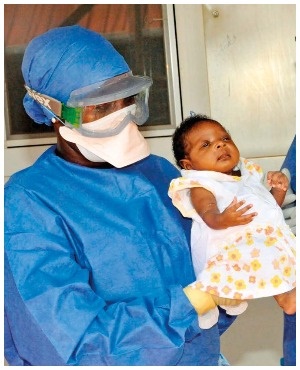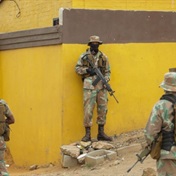
It’s like a scene from a nuclear disaster: workers in protective plastic clothes carrying make-shift medical stretchers; bodies stacked high, covered in sheets; the stench of death permeating the air.
This might sound like something from a horror movie but for the people of Guinea it was a tragic reality when the country experienced the worst Ebola outbreak in history a few years ago.
More than 11 000 people died and families were torn apart. Which is why the miraculous survival of one of the disease’s tiniest victims gripped the world – baby Nubia is the only newborn to have survived the deadly scourge.
The toddler, now two-and-a-half years old, is the picture of health. Her uncle, known only as Adama, can’t believe the chubby-cheeked child is the same ashen, weak baby he saw moments after her mom died of the disease.
“I felt so much emotion when I saw her,” he said of seeing his niece for the first time in two years.
“Last time we visited her she looked so different. Now she looks healthy. We didn’t think she’d survive. But she’s a warrior.”
Adama credits Nubia’s miracle recovery to medical staff who helped nurse her after she was born in a treatment centre run by Doctors without Borders –or Médecins Sans Frontières (MSF) – in Guinea.
MSF’s Dr Marie Claire Kolié said Nubia’s mother approached them in 2015 when she was seven months pregnant to get tested for Ebola.
“We thought when she went into labour the baby would be premature and die shortly after birth – as have all newborns who have Ebola.”
Dr Kolié examined Nubia and saw her reflexes were fine. “I thought at that point this baby could maybe survive.”
The little girl was diagnosed with congenital Ebola, meaning she inherited it from her mother. Scientists say children with the virus are less likely to experience haemorrhage or central nervous system failure. The incurable and highly infectious disease typically starts with a fever, followed by a sore throat and muscle pain. But as the virus ravages the body, the flu-like symptoms quickly escalate to vomiting and diarrhoea.
By day five a rash starts to creep around the face and by day seven patients experience difficulty breathing and internal bleeding before dying. Doctors quickly got to work treating Nubia to prevent the same fate.
“We were so frustrated after the death of the mother and made a huge effort to save this baby,” Dr Kolié recalled. She was treated with experimental drugs – one was so new it didn’t even have a name at the time.
Four days after starting treatment Dr Kolié was concerned. “A fever set in and morale was low. We conferred to work out a solution. Eventually she stabilised and here we are today.”
Nubia – who is named after a Brazilian nurse who cared for her – eventually left the treatment centre. She attended a MSF clinic for Ebola survivors for a year but has now made a full recovery.Before her, doctors thought a baby whose mother contracted Ebola while pregnant couldn’t survive. Now Nubia’s life-saving treatment is being rolled out in the Democratic Republic of the Congo where over 50 cases of Ebola have been reported, along with 25 deaths.
It’s the ninth Ebola outbreak recorded in the central African nation, whose Ebola river gave the deadly virus its name when it was discovered there in the 1970s.
Sources: msf.org , Telegraph.co.uk , cnn.com


















